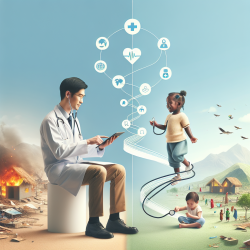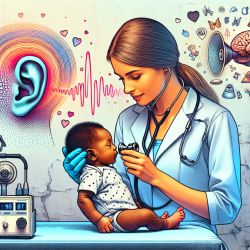Introduction
As a practitioner in the field of speech-language pathology, staying informed about emerging technologies can significantly enhance your practice. One such groundbreaking field is synthetic biology, which combines biological and engineering concepts. This blog post explores the insights from the research article "Tracking the Emergence of Synthetic Biology" and discusses how practitioners can leverage these findings to improve their skills and outcomes for children.
Understanding Synthetic Biology
Synthetic biology is an interdisciplinary field that involves the design and engineering of biological components and systems at the genetic level. The field has witnessed rapid growth and international spread, with diverse research disciplines contributing to its development. According to the research article, synthetic biology holds the potential to address global challenges, including food and energy security, and offers new methods to target medical conditions.
Data-Driven Insights for Practitioners
The research article employs a bibliometric approach to delineate synthetic biology, providing a comprehensive analysis of the field's growth and international spread. For practitioners, this data-driven approach offers valuable insights into the interdisciplinary nature of synthetic biology and its potential applications in various domains.
- Interdisciplinary Collaboration: The field of synthetic biology thrives on collaboration across disciplines. Practitioners can benefit from engaging with professionals from diverse fields, such as engineering, computer science, and biochemistry, to enhance their understanding and application of synthetic biology concepts.
- Innovative Applications: Synthetic biology offers innovative solutions to address complex challenges. Practitioners can explore how these solutions can be applied in their practice, such as developing new therapeutic approaches or enhancing diagnostic techniques.
- Continuous Learning: The rapid growth of synthetic biology underscores the importance of continuous learning. Practitioners should stay updated with the latest research and developments in the field to remain at the forefront of innovation.
Encouraging Further Research
The research article highlights the need for further work in synthetic biology, particularly in addressing ethical, risk, and policy concerns. Practitioners are encouraged to contribute to this ongoing research by exploring the implications of synthetic biology in their practice and engaging in discussions on responsible research and innovation.
Conclusion
Synthetic biology represents a transformative field with significant potential to impact various domains, including speech-language pathology. By leveraging the insights from the research article, practitioners can enhance their skills, collaborate across disciplines, and contribute to the responsible advancement of synthetic biology. To read the original research paper, please follow this link: Tracking the emergence of synthetic biology.










